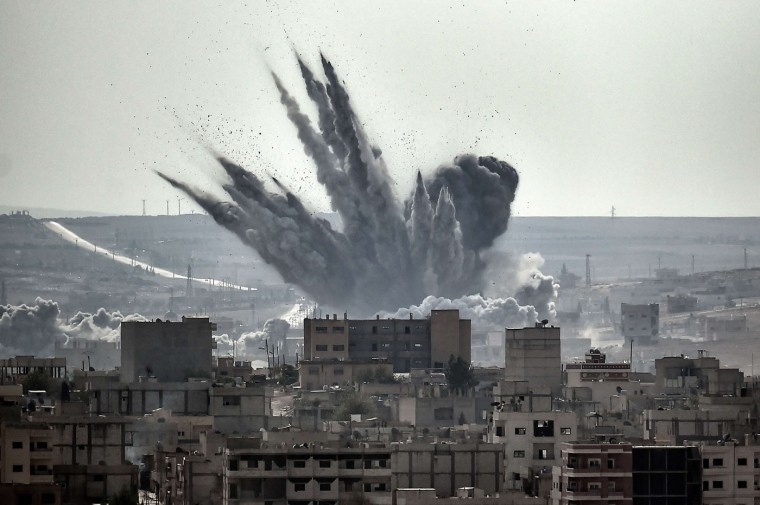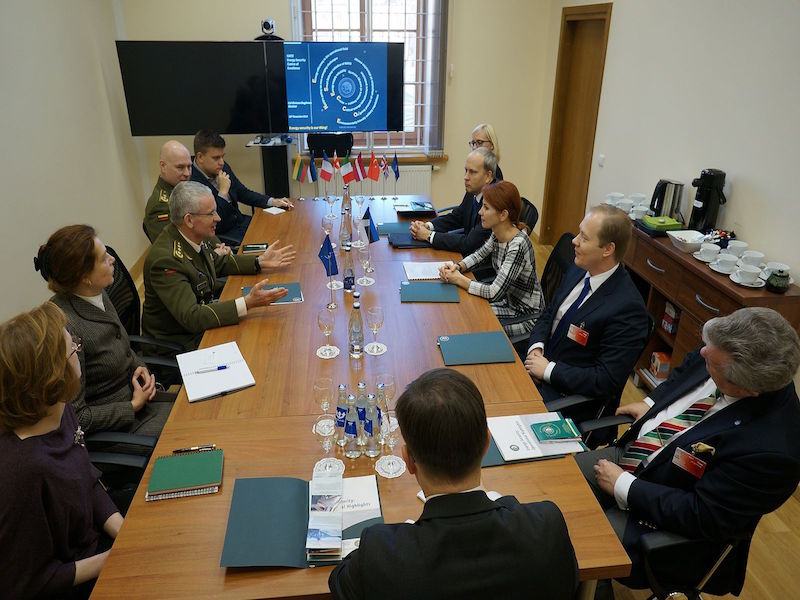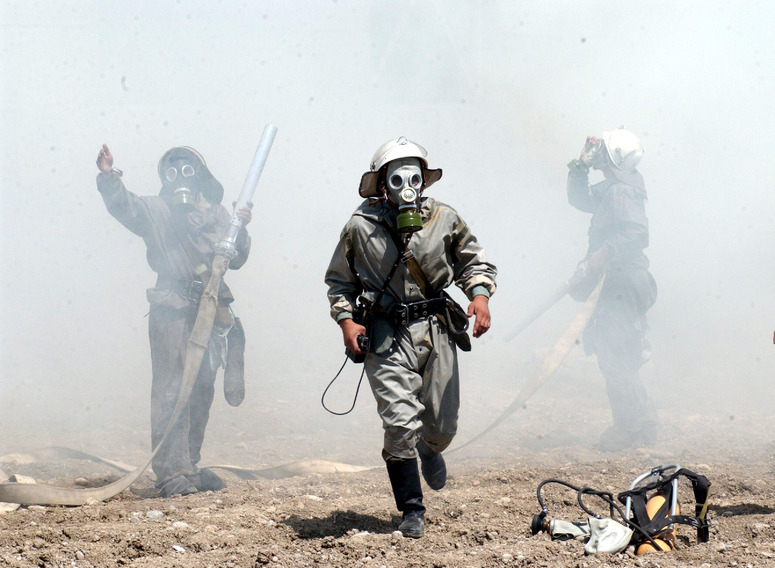The brutal battle for east Aleppo was marked by such civilian bloodshed that it has been described as a stain on the conscience of humanity. Thousands of civilian lives were lost as a result of blatant disregard for international laws, and a lack of humanitarian access to the city created indescribable suffering. International inaction evoked comparisons to the Holocaust and genocides in Rwanda and the former Yugoslavia, after all of which the world swore ‘Never again’.
Syrians trapped within the city pleaded desperately for help as hundreds of dead and wounded civilians, including scores of children, littered Aleppo’s streets. Photos and videos emerging from the dust painted a terrifying portrait in real time, and social media networks were flooded with the chilling words of activists, journalists, and civilians both bidding the world farewell and begging to be saved. Among them was a 7-year-old Syrian girl named Bana al-Abed, whose tweets have gained international recognition for their poignant descriptions of living under siege. On December 14, 2016, as the battle for Aleppo intensified, Bana’s mother Fatemah tweeted a cry for help to the account of Mevlüt Çavuşoğlu, Turkey’s Minister of Foreign Affairs. Mr. Çavuşoğlu replied: “Keep your hope my sister. Turkey hears your call. We work hard to end the nightmare you and many children in Syria are going through.”
Russia-Turkey ceasefire deal
In the weeks since Aleppo fell to the regime, Mr. Çavuşoğlu has honored his word as Turkey moves towards an increasingly prominent role in the Syrian conflict. After thousands of Turkish civilians took to the streets of Istanbul in solidarity with the people of east Aleppo, protesting Russian and Syrian actions in the besieged city, Turkey announced plans to create a new refugee camp inside Syria to host Aleppo evacuees, and said it would welcome sick and wounded Syrians to its hospitals, and sent a ‘Make Way to Aleppo’ humanitarian convoy to the city.
Turkey has further emerged as a key player in international negotiations regarding the Syrian political process. In late December, Turkey successfully negotiated a ceasefire with Russian and Iranian military officials in order to evacuate both civilians and moderate rebels to the western province of Idlib. Subsequently, Ankara announced that along with Moscow and Tehran it would be participating in ongoing peace talks in Kazakhstan to negotiate a nation-wide solution in Syria.
The United States and United Nations were pointedly excluded from the Russian-Turkish led ceasefire negotiations, signalling a critical shift in both regional and global power dynamics centered largely on Turkey’s swivel from Washington to Moscow.
Strained ties between Erdogan and the Obama administration
A NATO ally since 1952, Turkey has long been one of Washington’s most significant strategic partners in the Middle East. However, ties between Ankara and Washington soured considerably in 2016.
The presence of Kurdish militias in the Syrian conflict has been a growing point of tension between Turkey and the US. As part of the coalition against the Islamic State, the Obama administration has armed and equipped hundreds of Syrian Kurdish fighters within the Syrian Democratic Forces in addition to assisting separate Kurdish militias known as the People’s Protection Units, openly praising the Kurds as important and reliable allies on the ground in Syria and Iraq. However, Ankara is deeply opposed to Washington’s backing of the Kurdish People’s Protection Units (YPG) because it considers these units to be closely linked with the Kurdistan Workers’ Party (PKK), a group fighting for an independent Kurdish state that would claim swathes of Turkey’s eastern territory. The PKK is considered a terrorist organization by Turkey, the European Union and the United States itself.
Turkish-American relations were further strained after the failed military coup against Turkish President Recep Tayyip Erdogan in July 2016. Erdogan blamed the uprising on a controversial Muslim cleric named Fethullah Gulen, accusing him of orchestrating the coup and coordinating ‘terrorist activity’ in Turkey through the Fethullah Terror Organization (FETO). In August, Erdogan formally requested the US to extradite Gulen, who has lived in Pennsylvania since fleeing Turkey in 1999. Washington has thus far refused to extradite Gulen on the basis of a lack of substantial evidence of his involvement in coordinating the coup. Erdogan has made his anger with the Obama administration clear, at one point issuing an ultimatum that the US will have to “make a choice between the coup-plotting terrorist…or the democratic country Turkey” and later expressing optimism that President-elect Donald Trump will fulfill the extradition request and improve Turkish-American relations.
Most recently, Turkey has criticized the US for failing to support its ongoing cross-border military operation on the Syria-Turkey border. Ankara launched Operation Euphrates Shield to retake the area from the Islamic State and secure the border in August, and has lambasted the US-led coalition for its lack of support. In a December press release, Erdogan said the US has failed to “honor its promise to help Turkey capture al-Bab”, a strategic border town captured by ISIS in 2013 and claimed to have “confirmed evidence” that the US-led coalition is supporting the radical terrorist group.
Ankara’s displeasure with Washington has only intensified in the early weeks of 2017, with President Erdogan threatening to renegotiate US use of the Incirlik air base in southern Turkey if the coalition does not begin providing aerial support to the military offensive on the Syrian border.
Turkish leverage: Aleppo for Al-Bab?
The fall of east Aleppo to the Syrian regime highlighted Turkey’s pivot from Washington to Moscow. Having backed the Free Syrian Army since the civil war broke out in 2011 and called for the removal of Syrian President Bashar al-Assad, Erdogan’s noticeable failure to support the rebels in their fight to retain control of Aleppo raised several key questions.
It appears that Ankara has reversed its support for US policy in the region, aimed at equipping the rebels to drive Assad from power, in favour of a rapprochement with Russia. Rather than replenishing rebel forces in the battle for Aleppo, Turkey sought to cut its losses, negotiating the evacuation deal of moderate rebels to Idlib and relocating opposition fighters to offensive positions in the al-Bab region. Likely influenced by Trump’s unclear policy towards the rebels, Ankara evidently recognized the slim likelihood of rebel victory in Aleppo and instead chose to suppress Kurdish and IS growth on its borders rather than risk conflict with Russia.
Though neither Moscow nor Ankara have confirmed the existence of such a deal, it appears that Turkey allowed the fall of Aleppo with little pushback in exchange for Russian support in al-Bab. Shortly after Aleppo was recaptured by the regime, Russia launched airstrikes on IS targets in al-Bab in support of Operation Euphrates Shield. Given that Moscow had never previously supported the mission since its launch in August 2016, Russia’s deepening ties with Turkey seem a deliberate attempt to exploit Ankara’s dissatisfaction with Washington and further diminish American leverage in Syria.
After a diplomatic lowpoint over the Turkish downing of a Russian fighter jet in 2015, the budding tactical alliance between Moscow and Ankara is a significant shift in global relations.
The visible pivot in Turkey’s objectives and alliances in the Middle Eastern theatre will have both strong ramifications for Washington’s power in the region and a critical impact on the Syrian peace process in the future.
Photo: Russian President Vladimir Putin with Turkish Prime Minister Recep Tayyip Erdoğan after news conference following a meeting of High-Level Russian-Turkish Cooperation Council, Istanbul, Turkey. (2012), by Russian Presidential Press and Information Office via Wikimedia Commons. Licensed under CC BY 4.0.
Disclaimer: Any views or opinions expressed in articles are solely those of the authors and do not necessarily represent the views of the NATO Association of Canada.




